Significance of Accounting Education and Its Current Issues
VerifiedAdded on 2023/06/06
|24
|6139
|279
Report
AI Summary
This research proposal delves into the critical importance of accounting education and the challenges it faces in the modern business landscape. It explores the evolution of accounting roles, the impact of globalization and technology, and the resulting changes in accounting education. The study outlines the research problem, which centers on the gap between accounting education and practical application, and sets forth research questions and objectives to assess the significance of accounting education. A comprehensive literature review covers the overview of accounting education, its significance, and the issues at hand. The methodology section details the research design, approach, data collection, sampling plans, and data analysis methods. The proposal aims to examine the curriculum of accounting education and its impact, the challenges faced by accountants, and the role of policy implementation in bridging the gap between education and practice. The proposal concludes by emphasizing the need for updated accounting education and its importance for the development of the accounting profession and the economy.
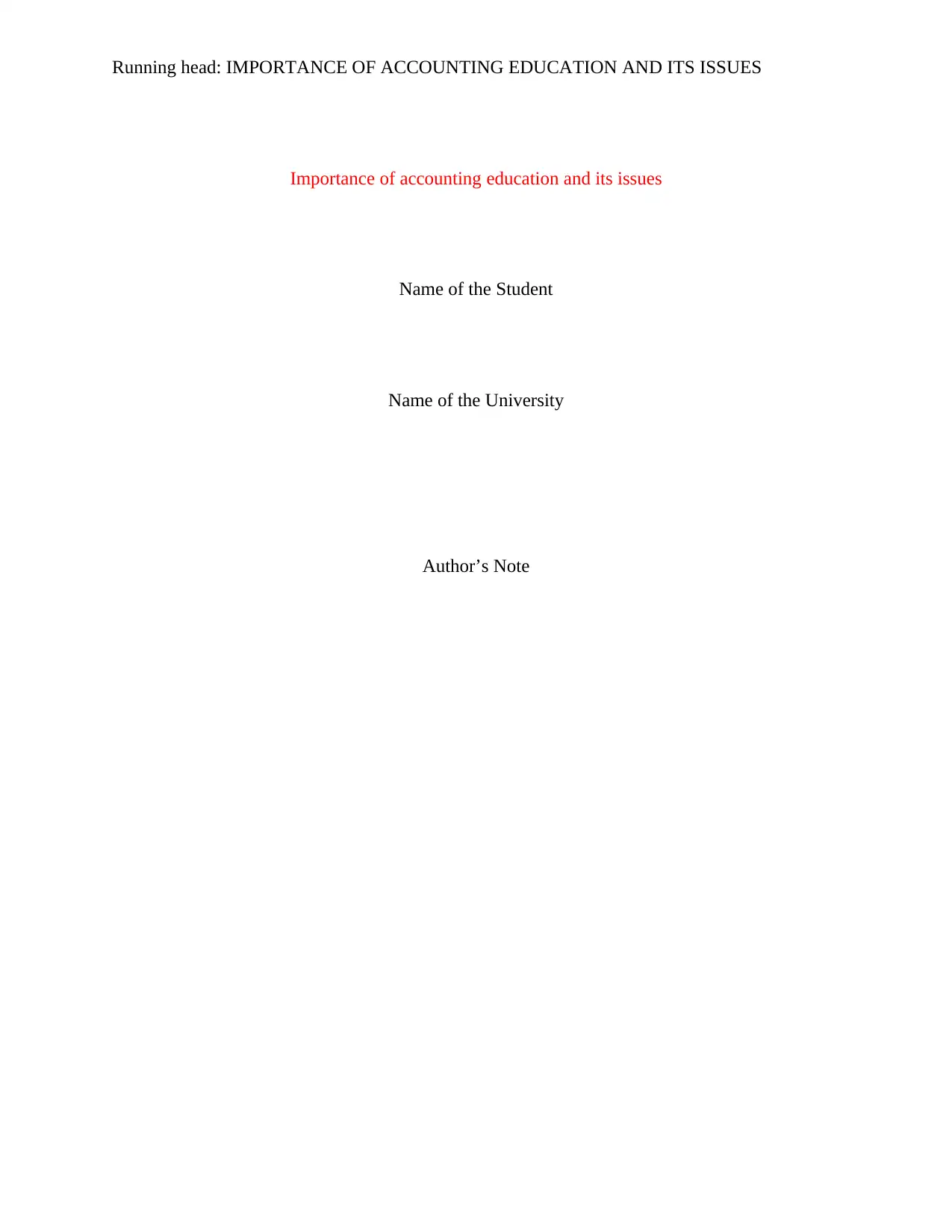
Running head: IMPORTANCE OF ACCOUNTING EDUCATION AND ITS ISSUES
Importance of accounting education and its issues
Name of the Student
Name of the University
Author’s Note
Importance of accounting education and its issues
Name of the Student
Name of the University
Author’s Note
Paraphrase This Document
Need a fresh take? Get an instant paraphrase of this document with our AI Paraphraser
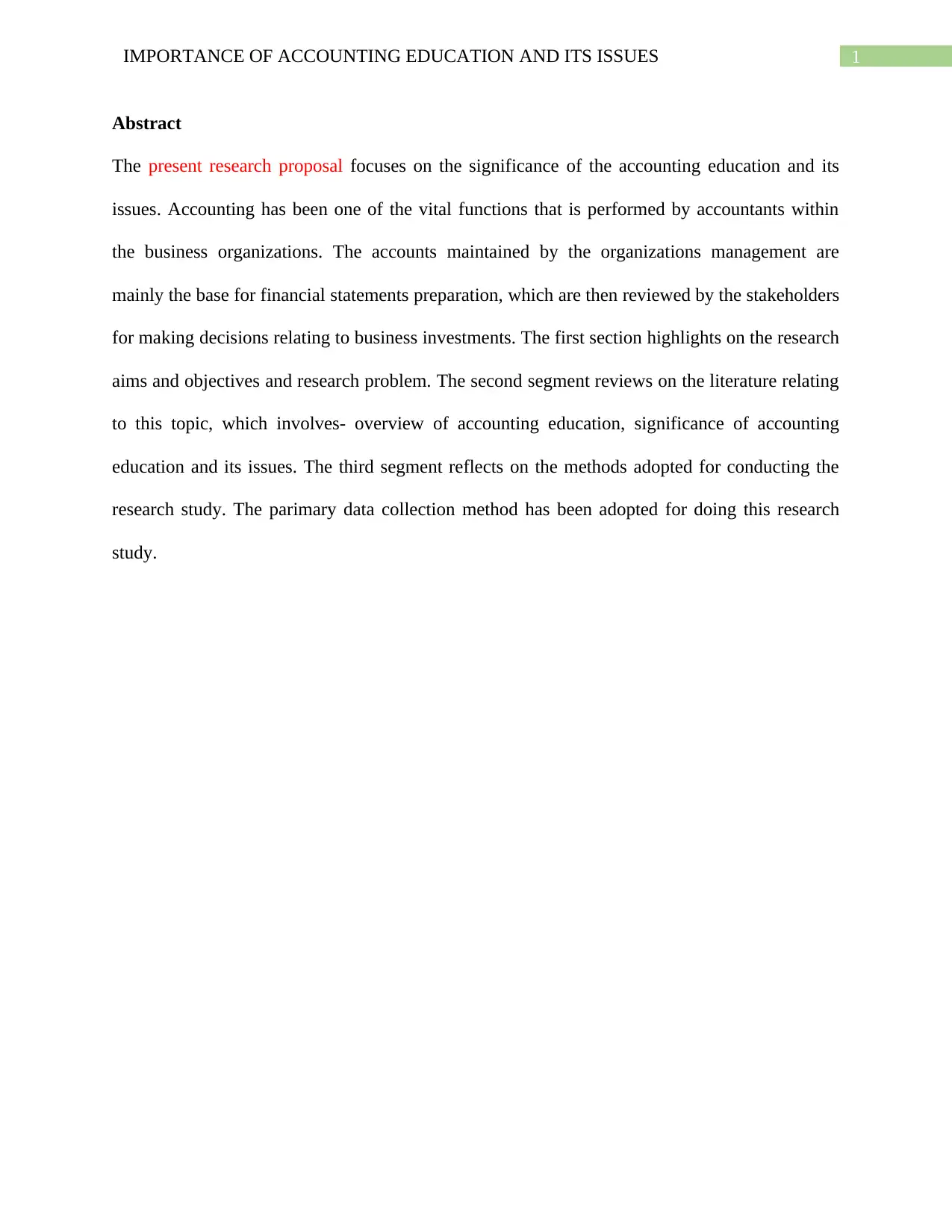
1IMPORTANCE OF ACCOUNTING EDUCATION AND ITS ISSUES
Abstract
The present research proposal focuses on the significance of the accounting education and its
issues. Accounting has been one of the vital functions that is performed by accountants within
the business organizations. The accounts maintained by the organizations management are
mainly the base for financial statements preparation, which are then reviewed by the stakeholders
for making decisions relating to business investments. The first section highlights on the research
aims and objectives and research problem. The second segment reviews on the literature relating
to this topic, which involves- overview of accounting education, significance of accounting
education and its issues. The third segment reflects on the methods adopted for conducting the
research study. The parimary data collection method has been adopted for doing this research
study.
Abstract
The present research proposal focuses on the significance of the accounting education and its
issues. Accounting has been one of the vital functions that is performed by accountants within
the business organizations. The accounts maintained by the organizations management are
mainly the base for financial statements preparation, which are then reviewed by the stakeholders
for making decisions relating to business investments. The first section highlights on the research
aims and objectives and research problem. The second segment reviews on the literature relating
to this topic, which involves- overview of accounting education, significance of accounting
education and its issues. The third segment reflects on the methods adopted for conducting the
research study. The parimary data collection method has been adopted for doing this research
study.
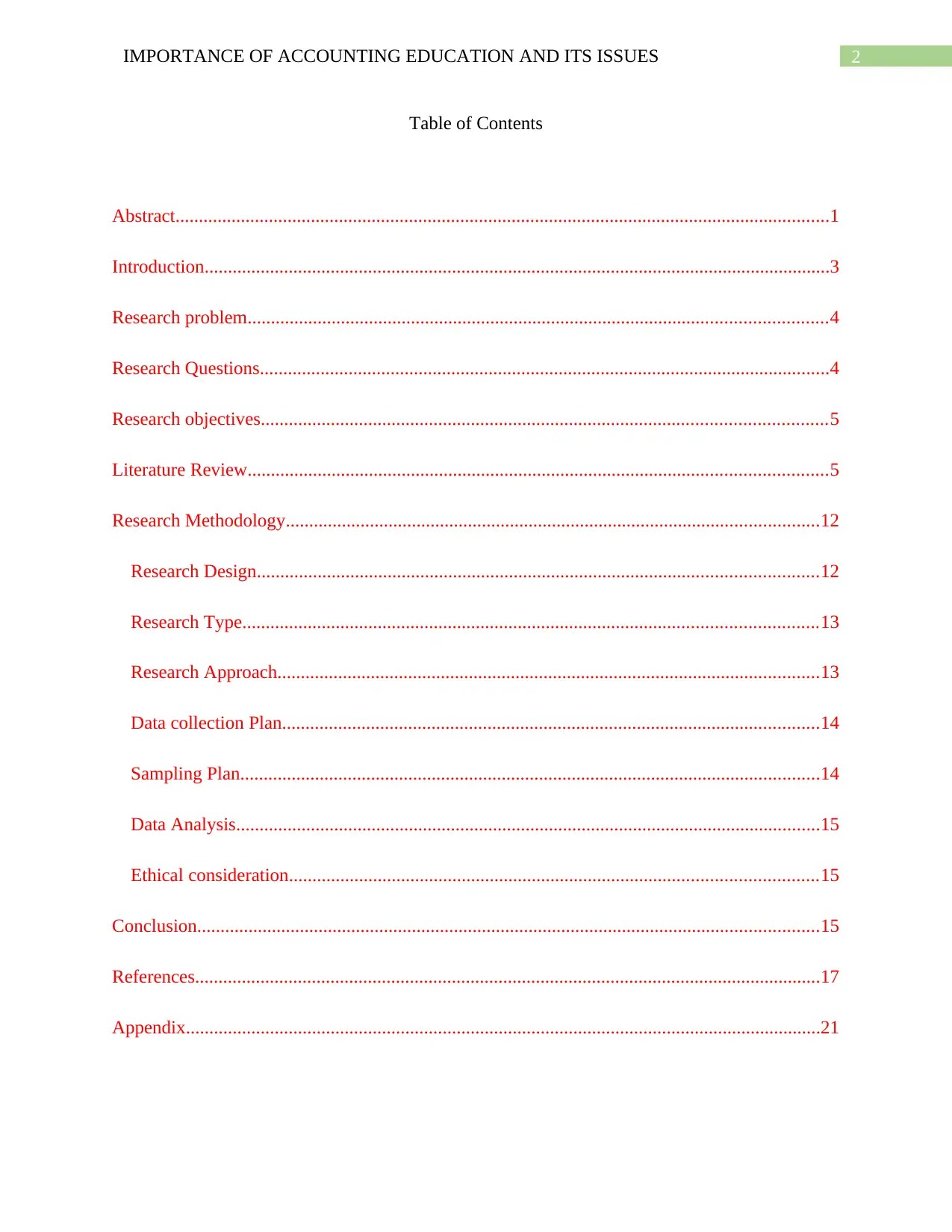
2IMPORTANCE OF ACCOUNTING EDUCATION AND ITS ISSUES
Table of Contents
Abstract............................................................................................................................................1
Introduction......................................................................................................................................3
Research problem............................................................................................................................4
Research Questions..........................................................................................................................4
Research objectives.........................................................................................................................5
Literature Review............................................................................................................................5
Research Methodology..................................................................................................................12
Research Design........................................................................................................................12
Research Type...........................................................................................................................13
Research Approach....................................................................................................................13
Data collection Plan...................................................................................................................14
Sampling Plan............................................................................................................................14
Data Analysis.............................................................................................................................15
Ethical consideration.................................................................................................................15
Conclusion.....................................................................................................................................15
References......................................................................................................................................17
Appendix........................................................................................................................................21
Table of Contents
Abstract............................................................................................................................................1
Introduction......................................................................................................................................3
Research problem............................................................................................................................4
Research Questions..........................................................................................................................4
Research objectives.........................................................................................................................5
Literature Review............................................................................................................................5
Research Methodology..................................................................................................................12
Research Design........................................................................................................................12
Research Type...........................................................................................................................13
Research Approach....................................................................................................................13
Data collection Plan...................................................................................................................14
Sampling Plan............................................................................................................................14
Data Analysis.............................................................................................................................15
Ethical consideration.................................................................................................................15
Conclusion.....................................................................................................................................15
References......................................................................................................................................17
Appendix........................................................................................................................................21
⊘ This is a preview!⊘
Do you want full access?
Subscribe today to unlock all pages.

Trusted by 1+ million students worldwide
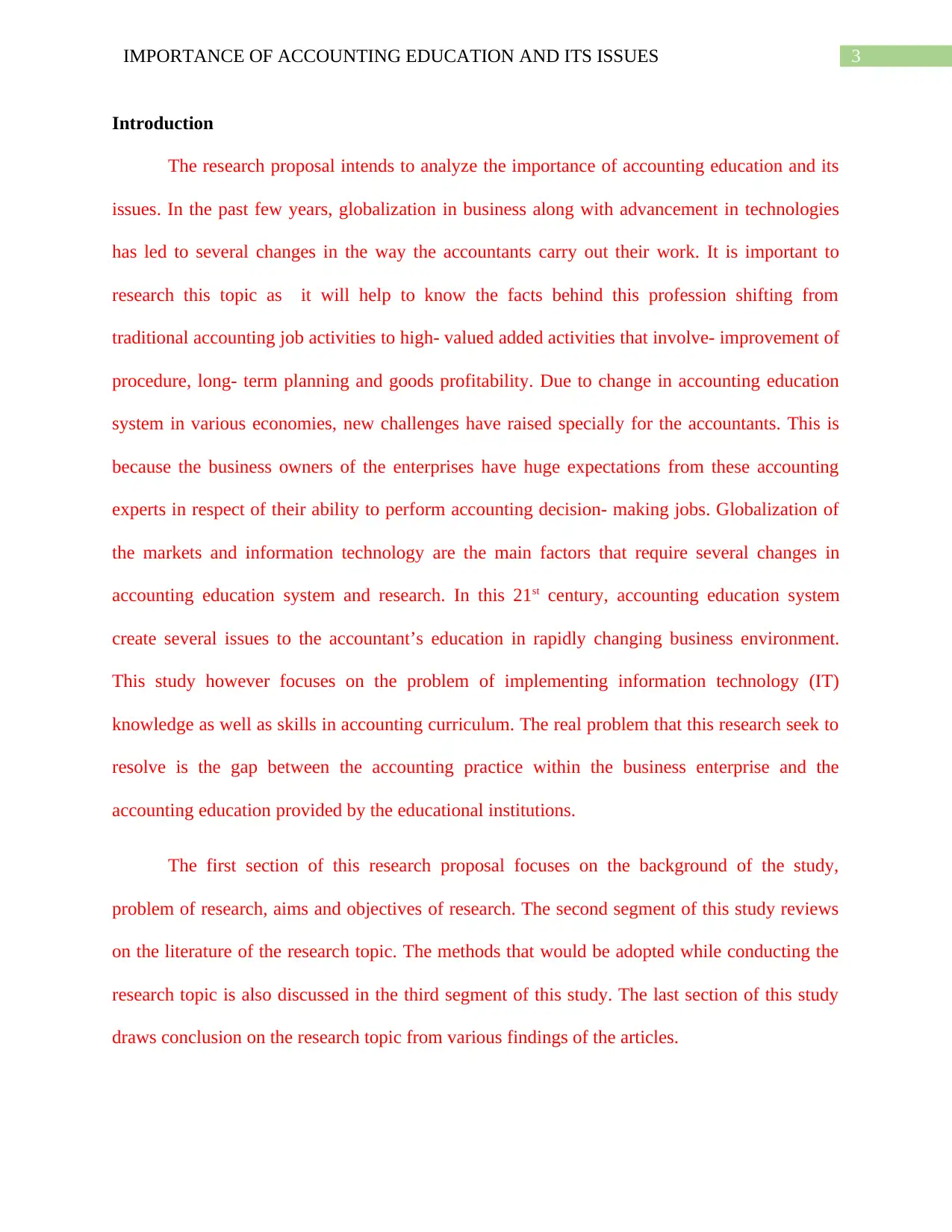
3IMPORTANCE OF ACCOUNTING EDUCATION AND ITS ISSUES
Introduction
The research proposal intends to analyze the importance of accounting education and its
issues. In the past few years, globalization in business along with advancement in technologies
has led to several changes in the way the accountants carry out their work. It is important to
research this topic as it will help to know the facts behind this profession shifting from
traditional accounting job activities to high- valued added activities that involve- improvement of
procedure, long- term planning and goods profitability. Due to change in accounting education
system in various economies, new challenges have raised specially for the accountants. This is
because the business owners of the enterprises have huge expectations from these accounting
experts in respect of their ability to perform accounting decision- making jobs. Globalization of
the markets and information technology are the main factors that require several changes in
accounting education system and research. In this 21st century, accounting education system
create several issues to the accountant’s education in rapidly changing business environment.
This study however focuses on the problem of implementing information technology (IT)
knowledge as well as skills in accounting curriculum. The real problem that this research seek to
resolve is the gap between the accounting practice within the business enterprise and the
accounting education provided by the educational institutions.
The first section of this research proposal focuses on the background of the study,
problem of research, aims and objectives of research. The second segment of this study reviews
on the literature of the research topic. The methods that would be adopted while conducting the
research topic is also discussed in the third segment of this study. The last section of this study
draws conclusion on the research topic from various findings of the articles.
Introduction
The research proposal intends to analyze the importance of accounting education and its
issues. In the past few years, globalization in business along with advancement in technologies
has led to several changes in the way the accountants carry out their work. It is important to
research this topic as it will help to know the facts behind this profession shifting from
traditional accounting job activities to high- valued added activities that involve- improvement of
procedure, long- term planning and goods profitability. Due to change in accounting education
system in various economies, new challenges have raised specially for the accountants. This is
because the business owners of the enterprises have huge expectations from these accounting
experts in respect of their ability to perform accounting decision- making jobs. Globalization of
the markets and information technology are the main factors that require several changes in
accounting education system and research. In this 21st century, accounting education system
create several issues to the accountant’s education in rapidly changing business environment.
This study however focuses on the problem of implementing information technology (IT)
knowledge as well as skills in accounting curriculum. The real problem that this research seek to
resolve is the gap between the accounting practice within the business enterprise and the
accounting education provided by the educational institutions.
The first section of this research proposal focuses on the background of the study,
problem of research, aims and objectives of research. The second segment of this study reviews
on the literature of the research topic. The methods that would be adopted while conducting the
research topic is also discussed in the third segment of this study. The last section of this study
draws conclusion on the research topic from various findings of the articles.
Paraphrase This Document
Need a fresh take? Get an instant paraphrase of this document with our AI Paraphraser
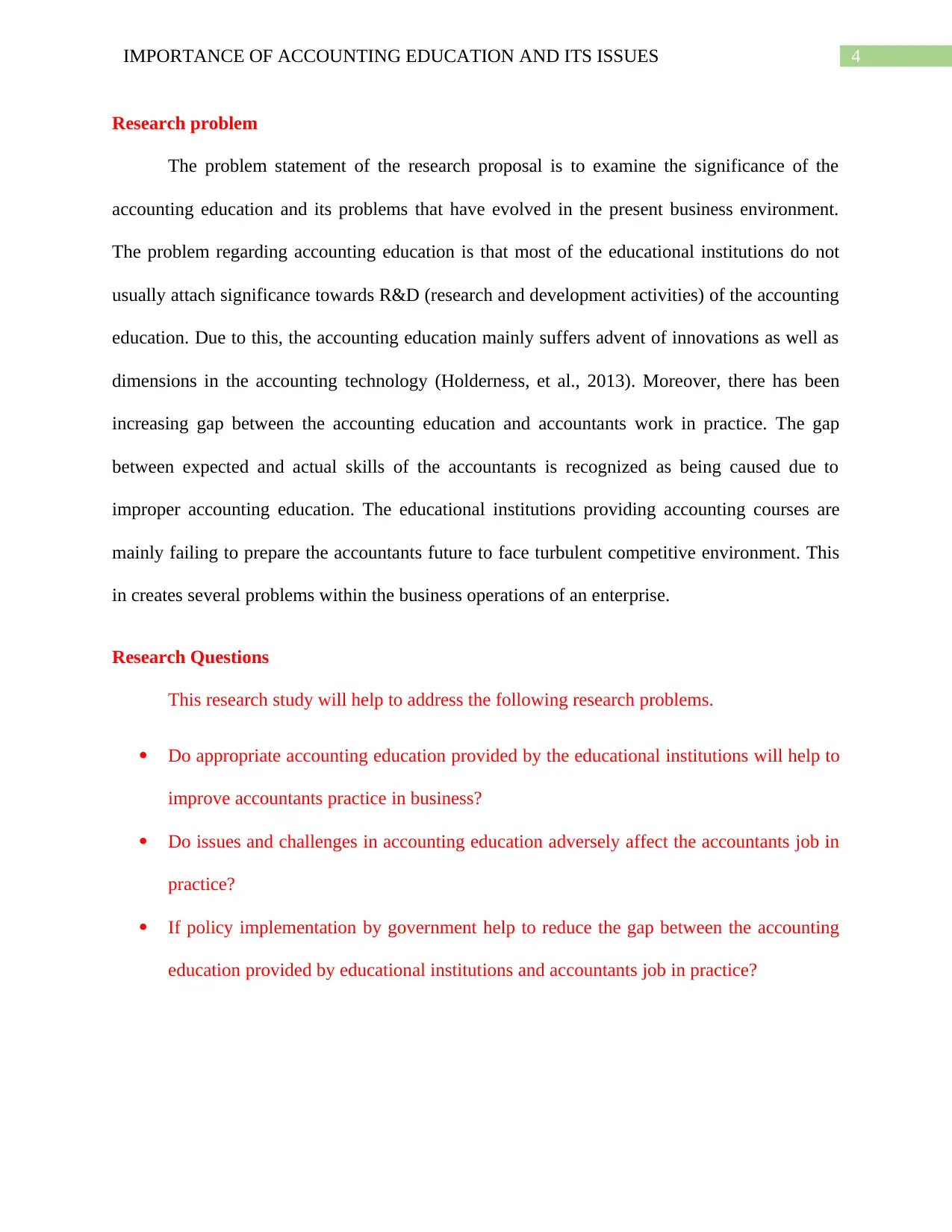
4IMPORTANCE OF ACCOUNTING EDUCATION AND ITS ISSUES
Research problem
The problem statement of the research proposal is to examine the significance of the
accounting education and its problems that have evolved in the present business environment.
The problem regarding accounting education is that most of the educational institutions do not
usually attach significance towards R&D (research and development activities) of the accounting
education. Due to this, the accounting education mainly suffers advent of innovations as well as
dimensions in the accounting technology (Holderness, et al., 2013). Moreover, there has been
increasing gap between the accounting education and accountants work in practice. The gap
between expected and actual skills of the accountants is recognized as being caused due to
improper accounting education. The educational institutions providing accounting courses are
mainly failing to prepare the accountants future to face turbulent competitive environment. This
in creates several problems within the business operations of an enterprise.
Research Questions
This research study will help to address the following research problems.
Do appropriate accounting education provided by the educational institutions will help to
improve accountants practice in business?
Do issues and challenges in accounting education adversely affect the accountants job in
practice?
If policy implementation by government help to reduce the gap between the accounting
education provided by educational institutions and accountants job in practice?
Research problem
The problem statement of the research proposal is to examine the significance of the
accounting education and its problems that have evolved in the present business environment.
The problem regarding accounting education is that most of the educational institutions do not
usually attach significance towards R&D (research and development activities) of the accounting
education. Due to this, the accounting education mainly suffers advent of innovations as well as
dimensions in the accounting technology (Holderness, et al., 2013). Moreover, there has been
increasing gap between the accounting education and accountants work in practice. The gap
between expected and actual skills of the accountants is recognized as being caused due to
improper accounting education. The educational institutions providing accounting courses are
mainly failing to prepare the accountants future to face turbulent competitive environment. This
in creates several problems within the business operations of an enterprise.
Research Questions
This research study will help to address the following research problems.
Do appropriate accounting education provided by the educational institutions will help to
improve accountants practice in business?
Do issues and challenges in accounting education adversely affect the accountants job in
practice?
If policy implementation by government help to reduce the gap between the accounting
education provided by educational institutions and accountants job in practice?
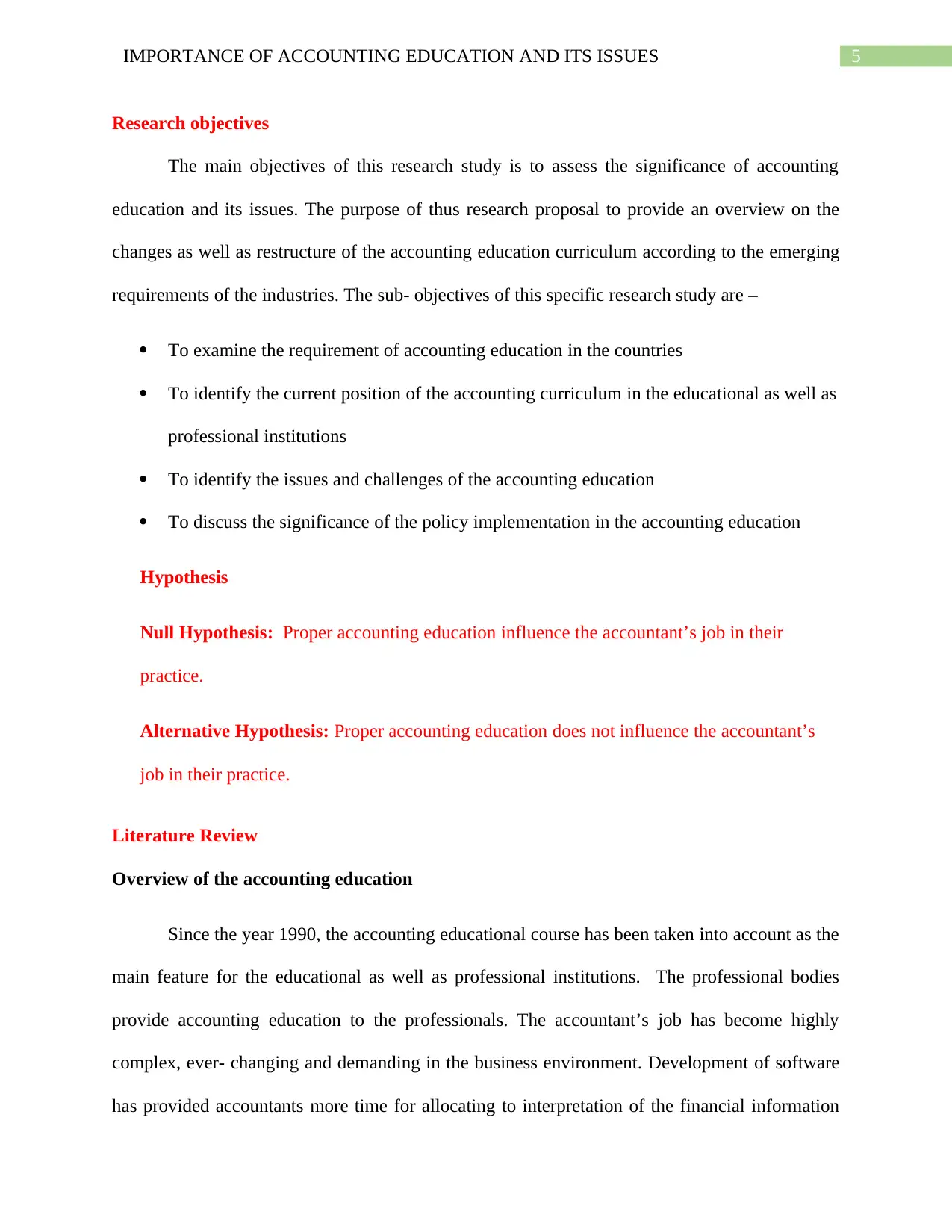
5IMPORTANCE OF ACCOUNTING EDUCATION AND ITS ISSUES
Research objectives
The main objectives of this research study is to assess the significance of accounting
education and its issues. The purpose of thus research proposal to provide an overview on the
changes as well as restructure of the accounting education curriculum according to the emerging
requirements of the industries. The sub- objectives of this specific research study are –
To examine the requirement of accounting education in the countries
To identify the current position of the accounting curriculum in the educational as well as
professional institutions
To identify the issues and challenges of the accounting education
To discuss the significance of the policy implementation in the accounting education
Hypothesis
Null Hypothesis: Proper accounting education influence the accountant’s job in their
practice.
Alternative Hypothesis: Proper accounting education does not influence the accountant’s
job in their practice.
Literature Review
Overview of the accounting education
Since the year 1990, the accounting educational course has been taken into account as the
main feature for the educational as well as professional institutions. The professional bodies
provide accounting education to the professionals. The accountant’s job has become highly
complex, ever- changing and demanding in the business environment. Development of software
has provided accountants more time for allocating to interpretation of the financial information
Research objectives
The main objectives of this research study is to assess the significance of accounting
education and its issues. The purpose of thus research proposal to provide an overview on the
changes as well as restructure of the accounting education curriculum according to the emerging
requirements of the industries. The sub- objectives of this specific research study are –
To examine the requirement of accounting education in the countries
To identify the current position of the accounting curriculum in the educational as well as
professional institutions
To identify the issues and challenges of the accounting education
To discuss the significance of the policy implementation in the accounting education
Hypothesis
Null Hypothesis: Proper accounting education influence the accountant’s job in their
practice.
Alternative Hypothesis: Proper accounting education does not influence the accountant’s
job in their practice.
Literature Review
Overview of the accounting education
Since the year 1990, the accounting educational course has been taken into account as the
main feature for the educational as well as professional institutions. The professional bodies
provide accounting education to the professionals. The accountant’s job has become highly
complex, ever- changing and demanding in the business environment. Development of software
has provided accountants more time for allocating to interpretation of the financial information
⊘ This is a preview!⊘
Do you want full access?
Subscribe today to unlock all pages.

Trusted by 1+ million students worldwide
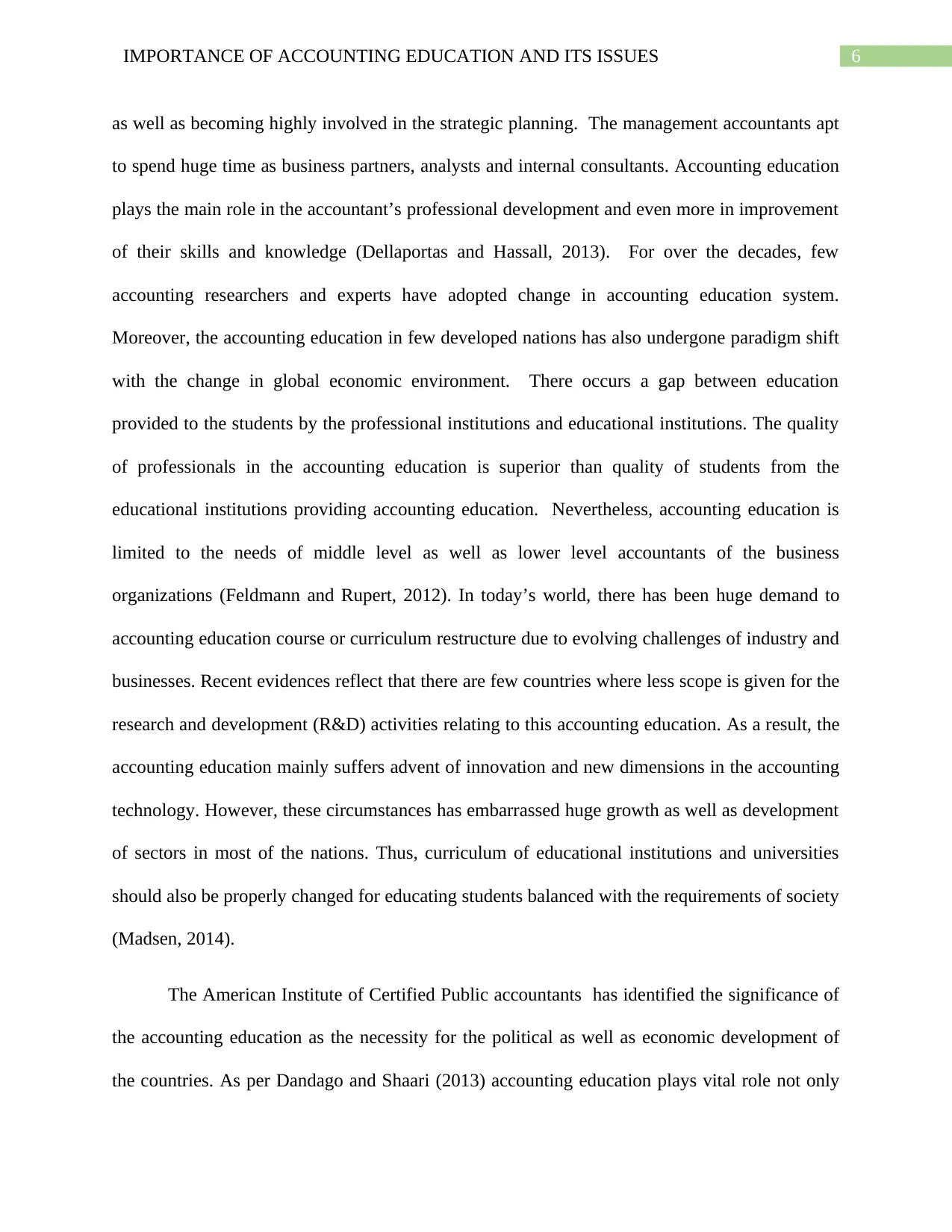
6IMPORTANCE OF ACCOUNTING EDUCATION AND ITS ISSUES
as well as becoming highly involved in the strategic planning. The management accountants apt
to spend huge time as business partners, analysts and internal consultants. Accounting education
plays the main role in the accountant’s professional development and even more in improvement
of their skills and knowledge (Dellaportas and Hassall, 2013). For over the decades, few
accounting researchers and experts have adopted change in accounting education system.
Moreover, the accounting education in few developed nations has also undergone paradigm shift
with the change in global economic environment. There occurs a gap between education
provided to the students by the professional institutions and educational institutions. The quality
of professionals in the accounting education is superior than quality of students from the
educational institutions providing accounting education. Nevertheless, accounting education is
limited to the needs of middle level as well as lower level accountants of the business
organizations (Feldmann and Rupert, 2012). In today’s world, there has been huge demand to
accounting education course or curriculum restructure due to evolving challenges of industry and
businesses. Recent evidences reflect that there are few countries where less scope is given for the
research and development (R&D) activities relating to this accounting education. As a result, the
accounting education mainly suffers advent of innovation and new dimensions in the accounting
technology. However, these circumstances has embarrassed huge growth as well as development
of sectors in most of the nations. Thus, curriculum of educational institutions and universities
should also be properly changed for educating students balanced with the requirements of society
(Madsen, 2014).
The American Institute of Certified Public accountants has identified the significance of
the accounting education as the necessity for the political as well as economic development of
the countries. As per Dandago and Shaari (2013) accounting education plays vital role not only
as well as becoming highly involved in the strategic planning. The management accountants apt
to spend huge time as business partners, analysts and internal consultants. Accounting education
plays the main role in the accountant’s professional development and even more in improvement
of their skills and knowledge (Dellaportas and Hassall, 2013). For over the decades, few
accounting researchers and experts have adopted change in accounting education system.
Moreover, the accounting education in few developed nations has also undergone paradigm shift
with the change in global economic environment. There occurs a gap between education
provided to the students by the professional institutions and educational institutions. The quality
of professionals in the accounting education is superior than quality of students from the
educational institutions providing accounting education. Nevertheless, accounting education is
limited to the needs of middle level as well as lower level accountants of the business
organizations (Feldmann and Rupert, 2012). In today’s world, there has been huge demand to
accounting education course or curriculum restructure due to evolving challenges of industry and
businesses. Recent evidences reflect that there are few countries where less scope is given for the
research and development (R&D) activities relating to this accounting education. As a result, the
accounting education mainly suffers advent of innovation and new dimensions in the accounting
technology. However, these circumstances has embarrassed huge growth as well as development
of sectors in most of the nations. Thus, curriculum of educational institutions and universities
should also be properly changed for educating students balanced with the requirements of society
(Madsen, 2014).
The American Institute of Certified Public accountants has identified the significance of
the accounting education as the necessity for the political as well as economic development of
the countries. As per Dandago and Shaari (2013) accounting education plays vital role not only
Paraphrase This Document
Need a fresh take? Get an instant paraphrase of this document with our AI Paraphraser
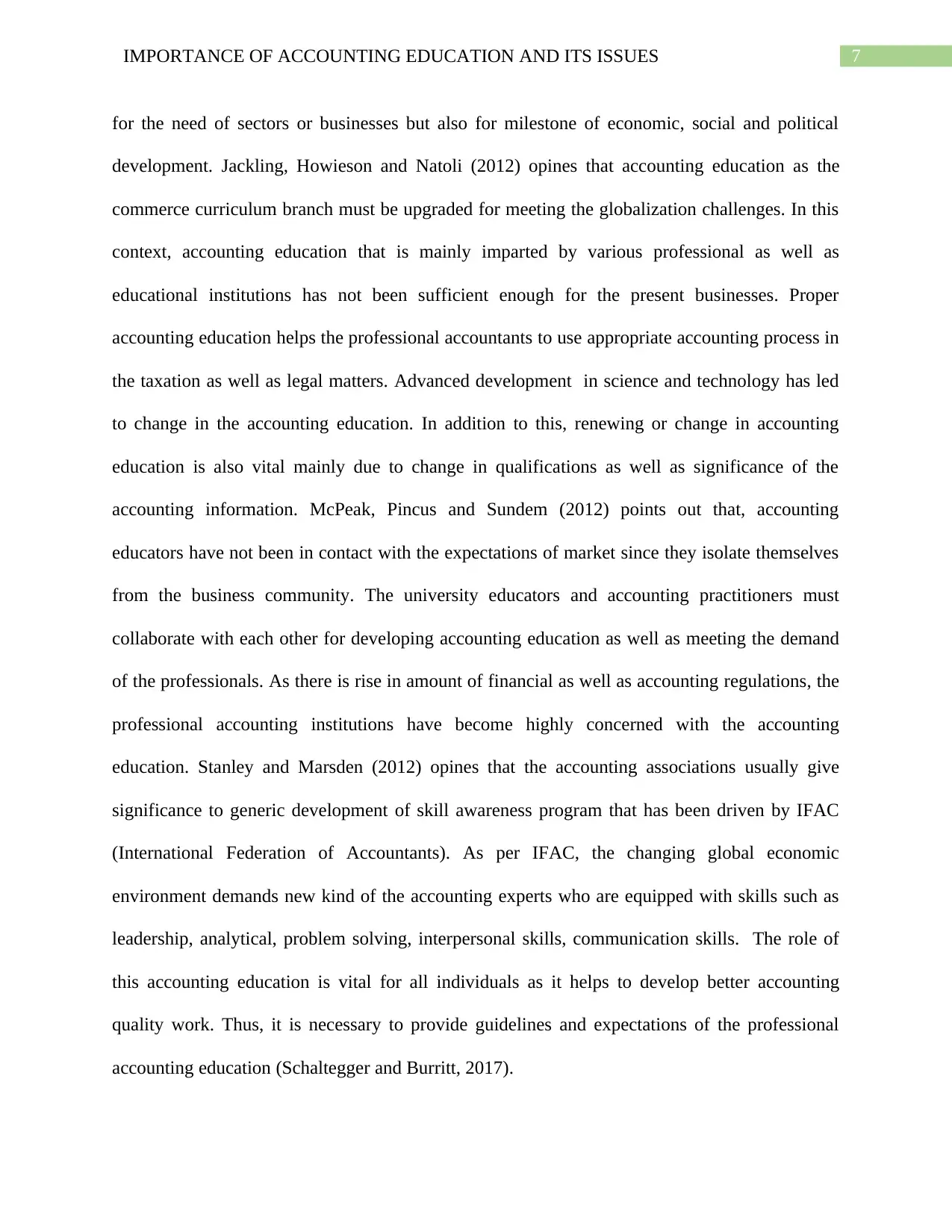
7IMPORTANCE OF ACCOUNTING EDUCATION AND ITS ISSUES
for the need of sectors or businesses but also for milestone of economic, social and political
development. Jackling, Howieson and Natoli (2012) opines that accounting education as the
commerce curriculum branch must be upgraded for meeting the globalization challenges. In this
context, accounting education that is mainly imparted by various professional as well as
educational institutions has not been sufficient enough for the present businesses. Proper
accounting education helps the professional accountants to use appropriate accounting process in
the taxation as well as legal matters. Advanced development in science and technology has led
to change in the accounting education. In addition to this, renewing or change in accounting
education is also vital mainly due to change in qualifications as well as significance of the
accounting information. McPeak, Pincus and Sundem (2012) points out that, accounting
educators have not been in contact with the expectations of market since they isolate themselves
from the business community. The university educators and accounting practitioners must
collaborate with each other for developing accounting education as well as meeting the demand
of the professionals. As there is rise in amount of financial as well as accounting regulations, the
professional accounting institutions have become highly concerned with the accounting
education. Stanley and Marsden (2012) opines that the accounting associations usually give
significance to generic development of skill awareness program that has been driven by IFAC
(International Federation of Accountants). As per IFAC, the changing global economic
environment demands new kind of the accounting experts who are equipped with skills such as
leadership, analytical, problem solving, interpersonal skills, communication skills. The role of
this accounting education is vital for all individuals as it helps to develop better accounting
quality work. Thus, it is necessary to provide guidelines and expectations of the professional
accounting education (Schaltegger and Burritt, 2017).
for the need of sectors or businesses but also for milestone of economic, social and political
development. Jackling, Howieson and Natoli (2012) opines that accounting education as the
commerce curriculum branch must be upgraded for meeting the globalization challenges. In this
context, accounting education that is mainly imparted by various professional as well as
educational institutions has not been sufficient enough for the present businesses. Proper
accounting education helps the professional accountants to use appropriate accounting process in
the taxation as well as legal matters. Advanced development in science and technology has led
to change in the accounting education. In addition to this, renewing or change in accounting
education is also vital mainly due to change in qualifications as well as significance of the
accounting information. McPeak, Pincus and Sundem (2012) points out that, accounting
educators have not been in contact with the expectations of market since they isolate themselves
from the business community. The university educators and accounting practitioners must
collaborate with each other for developing accounting education as well as meeting the demand
of the professionals. As there is rise in amount of financial as well as accounting regulations, the
professional accounting institutions have become highly concerned with the accounting
education. Stanley and Marsden (2012) opines that the accounting associations usually give
significance to generic development of skill awareness program that has been driven by IFAC
(International Federation of Accountants). As per IFAC, the changing global economic
environment demands new kind of the accounting experts who are equipped with skills such as
leadership, analytical, problem solving, interpersonal skills, communication skills. The role of
this accounting education is vital for all individuals as it helps to develop better accounting
quality work. Thus, it is necessary to provide guidelines and expectations of the professional
accounting education (Schaltegger and Burritt, 2017).
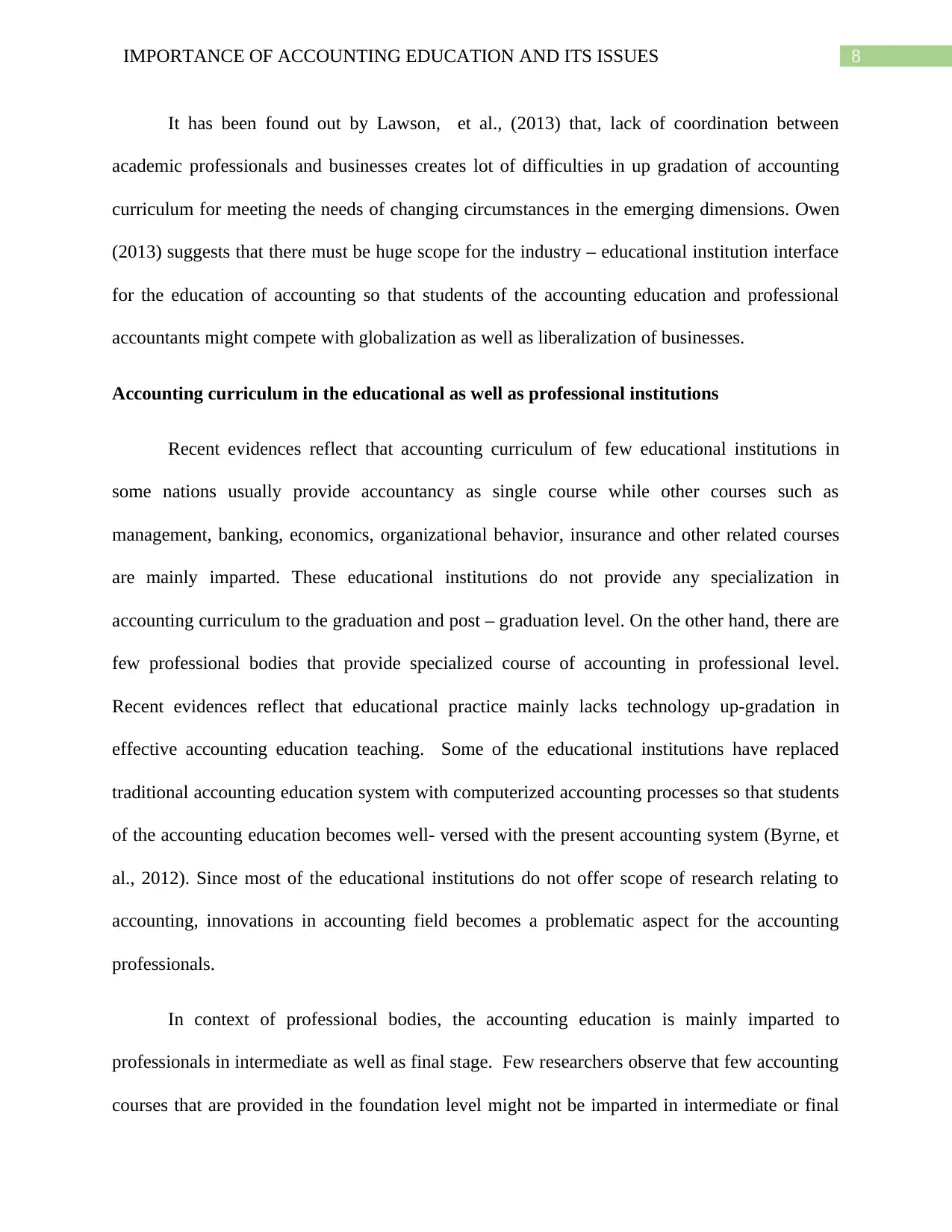
8IMPORTANCE OF ACCOUNTING EDUCATION AND ITS ISSUES
It has been found out by Lawson, et al., (2013) that, lack of coordination between
academic professionals and businesses creates lot of difficulties in up gradation of accounting
curriculum for meeting the needs of changing circumstances in the emerging dimensions. Owen
(2013) suggests that there must be huge scope for the industry – educational institution interface
for the education of accounting so that students of the accounting education and professional
accountants might compete with globalization as well as liberalization of businesses.
Accounting curriculum in the educational as well as professional institutions
Recent evidences reflect that accounting curriculum of few educational institutions in
some nations usually provide accountancy as single course while other courses such as
management, banking, economics, organizational behavior, insurance and other related courses
are mainly imparted. These educational institutions do not provide any specialization in
accounting curriculum to the graduation and post – graduation level. On the other hand, there are
few professional bodies that provide specialized course of accounting in professional level.
Recent evidences reflect that educational practice mainly lacks technology up-gradation in
effective accounting education teaching. Some of the educational institutions have replaced
traditional accounting education system with computerized accounting processes so that students
of the accounting education becomes well- versed with the present accounting system (Byrne, et
al., 2012). Since most of the educational institutions do not offer scope of research relating to
accounting, innovations in accounting field becomes a problematic aspect for the accounting
professionals.
In context of professional bodies, the accounting education is mainly imparted to
professionals in intermediate as well as final stage. Few researchers observe that few accounting
courses that are provided in the foundation level might not be imparted in intermediate or final
It has been found out by Lawson, et al., (2013) that, lack of coordination between
academic professionals and businesses creates lot of difficulties in up gradation of accounting
curriculum for meeting the needs of changing circumstances in the emerging dimensions. Owen
(2013) suggests that there must be huge scope for the industry – educational institution interface
for the education of accounting so that students of the accounting education and professional
accountants might compete with globalization as well as liberalization of businesses.
Accounting curriculum in the educational as well as professional institutions
Recent evidences reflect that accounting curriculum of few educational institutions in
some nations usually provide accountancy as single course while other courses such as
management, banking, economics, organizational behavior, insurance and other related courses
are mainly imparted. These educational institutions do not provide any specialization in
accounting curriculum to the graduation and post – graduation level. On the other hand, there are
few professional bodies that provide specialized course of accounting in professional level.
Recent evidences reflect that educational practice mainly lacks technology up-gradation in
effective accounting education teaching. Some of the educational institutions have replaced
traditional accounting education system with computerized accounting processes so that students
of the accounting education becomes well- versed with the present accounting system (Byrne, et
al., 2012). Since most of the educational institutions do not offer scope of research relating to
accounting, innovations in accounting field becomes a problematic aspect for the accounting
professionals.
In context of professional bodies, the accounting education is mainly imparted to
professionals in intermediate as well as final stage. Few researchers observe that few accounting
courses that are provided in the foundation level might not be imparted in intermediate or final
⊘ This is a preview!⊘
Do you want full access?
Subscribe today to unlock all pages.

Trusted by 1+ million students worldwide
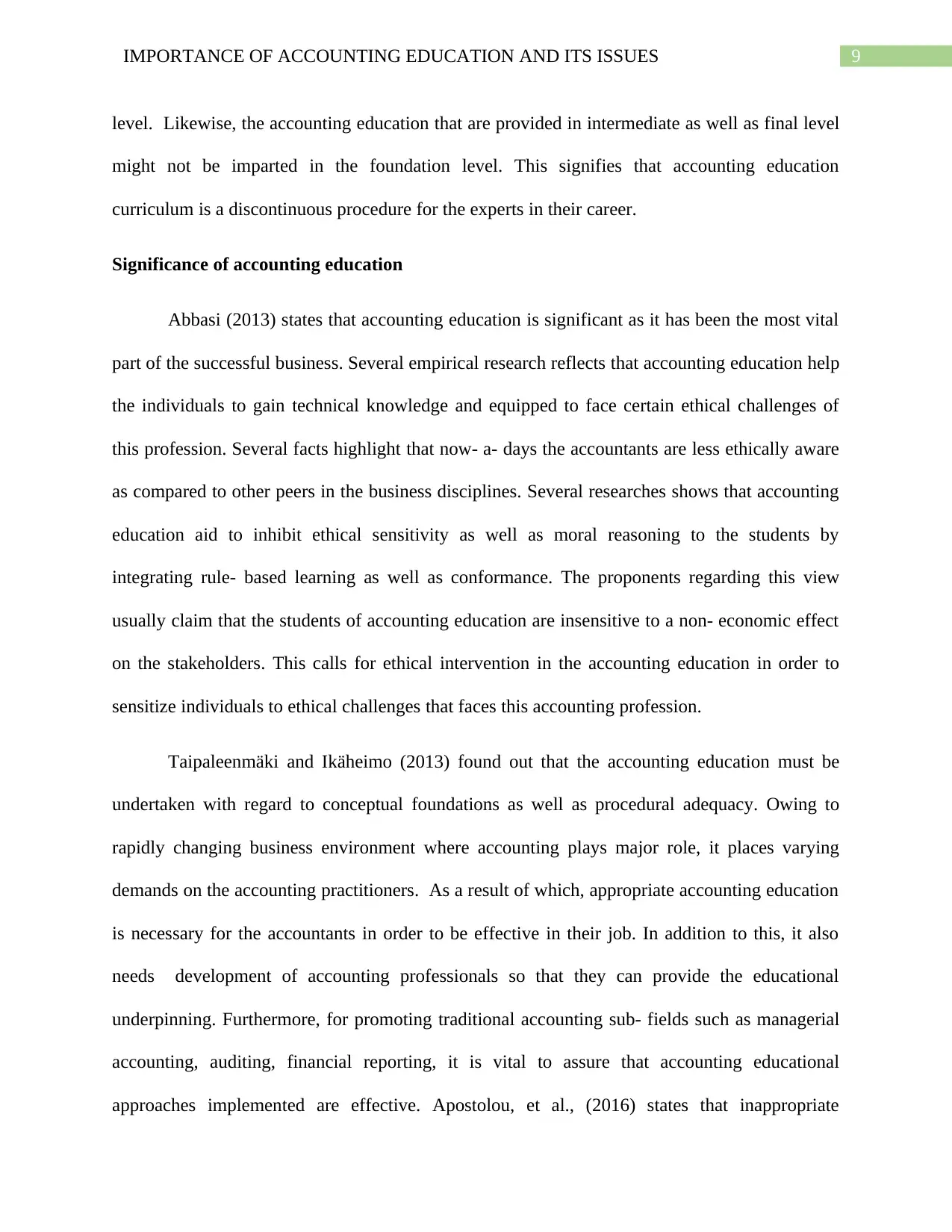
9IMPORTANCE OF ACCOUNTING EDUCATION AND ITS ISSUES
level. Likewise, the accounting education that are provided in intermediate as well as final level
might not be imparted in the foundation level. This signifies that accounting education
curriculum is a discontinuous procedure for the experts in their career.
Significance of accounting education
Abbasi (2013) states that accounting education is significant as it has been the most vital
part of the successful business. Several empirical research reflects that accounting education help
the individuals to gain technical knowledge and equipped to face certain ethical challenges of
this profession. Several facts highlight that now- a- days the accountants are less ethically aware
as compared to other peers in the business disciplines. Several researches shows that accounting
education aid to inhibit ethical sensitivity as well as moral reasoning to the students by
integrating rule- based learning as well as conformance. The proponents regarding this view
usually claim that the students of accounting education are insensitive to a non- economic effect
on the stakeholders. This calls for ethical intervention in the accounting education in order to
sensitize individuals to ethical challenges that faces this accounting profession.
Taipaleenmäki and Ikäheimo (2013) found out that the accounting education must be
undertaken with regard to conceptual foundations as well as procedural adequacy. Owing to
rapidly changing business environment where accounting plays major role, it places varying
demands on the accounting practitioners. As a result of which, appropriate accounting education
is necessary for the accountants in order to be effective in their job. In addition to this, it also
needs development of accounting professionals so that they can provide the educational
underpinning. Furthermore, for promoting traditional accounting sub- fields such as managerial
accounting, auditing, financial reporting, it is vital to assure that accounting educational
approaches implemented are effective. Apostolou, et al., (2016) states that inappropriate
level. Likewise, the accounting education that are provided in intermediate as well as final level
might not be imparted in the foundation level. This signifies that accounting education
curriculum is a discontinuous procedure for the experts in their career.
Significance of accounting education
Abbasi (2013) states that accounting education is significant as it has been the most vital
part of the successful business. Several empirical research reflects that accounting education help
the individuals to gain technical knowledge and equipped to face certain ethical challenges of
this profession. Several facts highlight that now- a- days the accountants are less ethically aware
as compared to other peers in the business disciplines. Several researches shows that accounting
education aid to inhibit ethical sensitivity as well as moral reasoning to the students by
integrating rule- based learning as well as conformance. The proponents regarding this view
usually claim that the students of accounting education are insensitive to a non- economic effect
on the stakeholders. This calls for ethical intervention in the accounting education in order to
sensitize individuals to ethical challenges that faces this accounting profession.
Taipaleenmäki and Ikäheimo (2013) found out that the accounting education must be
undertaken with regard to conceptual foundations as well as procedural adequacy. Owing to
rapidly changing business environment where accounting plays major role, it places varying
demands on the accounting practitioners. As a result of which, appropriate accounting education
is necessary for the accountants in order to be effective in their job. In addition to this, it also
needs development of accounting professionals so that they can provide the educational
underpinning. Furthermore, for promoting traditional accounting sub- fields such as managerial
accounting, auditing, financial reporting, it is vital to assure that accounting educational
approaches implemented are effective. Apostolou, et al., (2016) states that inappropriate
Paraphrase This Document
Need a fresh take? Get an instant paraphrase of this document with our AI Paraphraser
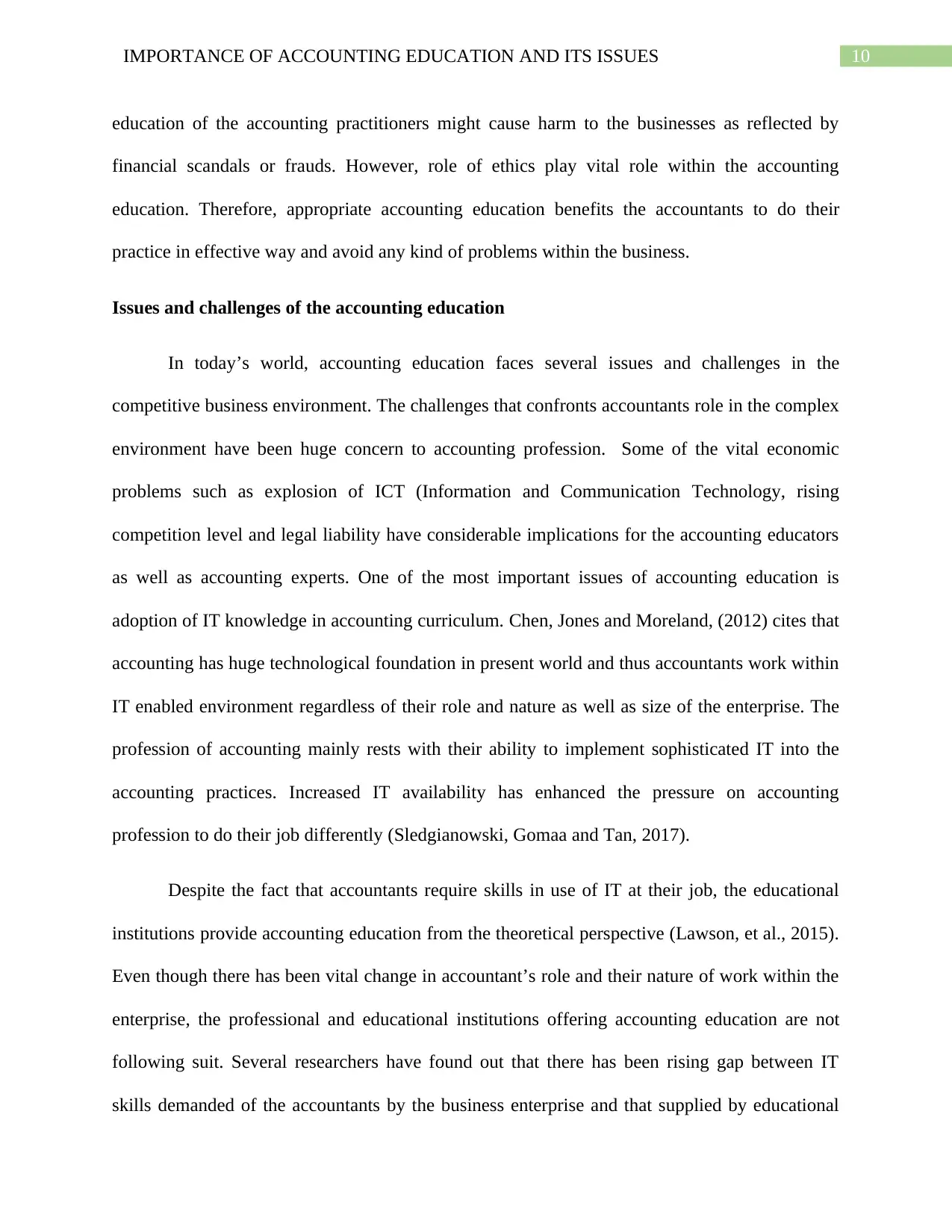
10IMPORTANCE OF ACCOUNTING EDUCATION AND ITS ISSUES
education of the accounting practitioners might cause harm to the businesses as reflected by
financial scandals or frauds. However, role of ethics play vital role within the accounting
education. Therefore, appropriate accounting education benefits the accountants to do their
practice in effective way and avoid any kind of problems within the business.
Issues and challenges of the accounting education
In today’s world, accounting education faces several issues and challenges in the
competitive business environment. The challenges that confronts accountants role in the complex
environment have been huge concern to accounting profession. Some of the vital economic
problems such as explosion of ICT (Information and Communication Technology, rising
competition level and legal liability have considerable implications for the accounting educators
as well as accounting experts. One of the most important issues of accounting education is
adoption of IT knowledge in accounting curriculum. Chen, Jones and Moreland, (2012) cites that
accounting has huge technological foundation in present world and thus accountants work within
IT enabled environment regardless of their role and nature as well as size of the enterprise. The
profession of accounting mainly rests with their ability to implement sophisticated IT into the
accounting practices. Increased IT availability has enhanced the pressure on accounting
profession to do their job differently (Sledgianowski, Gomaa and Tan, 2017).
Despite the fact that accountants require skills in use of IT at their job, the educational
institutions provide accounting education from the theoretical perspective (Lawson, et al., 2015).
Even though there has been vital change in accountant’s role and their nature of work within the
enterprise, the professional and educational institutions offering accounting education are not
following suit. Several researchers have found out that there has been rising gap between IT
skills demanded of the accountants by the business enterprise and that supplied by educational
education of the accounting practitioners might cause harm to the businesses as reflected by
financial scandals or frauds. However, role of ethics play vital role within the accounting
education. Therefore, appropriate accounting education benefits the accountants to do their
practice in effective way and avoid any kind of problems within the business.
Issues and challenges of the accounting education
In today’s world, accounting education faces several issues and challenges in the
competitive business environment. The challenges that confronts accountants role in the complex
environment have been huge concern to accounting profession. Some of the vital economic
problems such as explosion of ICT (Information and Communication Technology, rising
competition level and legal liability have considerable implications for the accounting educators
as well as accounting experts. One of the most important issues of accounting education is
adoption of IT knowledge in accounting curriculum. Chen, Jones and Moreland, (2012) cites that
accounting has huge technological foundation in present world and thus accountants work within
IT enabled environment regardless of their role and nature as well as size of the enterprise. The
profession of accounting mainly rests with their ability to implement sophisticated IT into the
accounting practices. Increased IT availability has enhanced the pressure on accounting
profession to do their job differently (Sledgianowski, Gomaa and Tan, 2017).
Despite the fact that accountants require skills in use of IT at their job, the educational
institutions provide accounting education from the theoretical perspective (Lawson, et al., 2015).
Even though there has been vital change in accountant’s role and their nature of work within the
enterprise, the professional and educational institutions offering accounting education are not
following suit. Several researchers have found out that there has been rising gap between IT
skills demanded of the accountants by the business enterprise and that supplied by educational
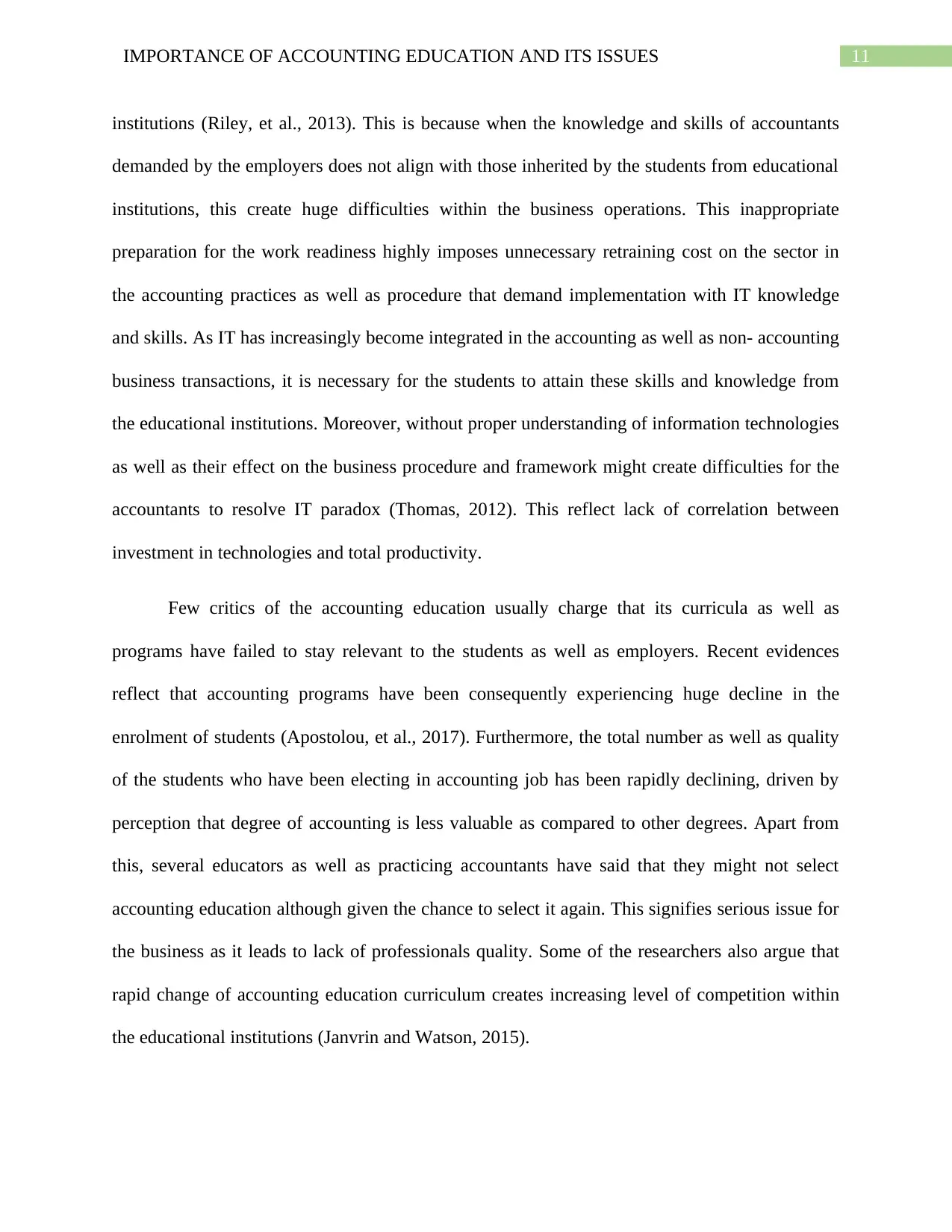
11IMPORTANCE OF ACCOUNTING EDUCATION AND ITS ISSUES
institutions (Riley, et al., 2013). This is because when the knowledge and skills of accountants
demanded by the employers does not align with those inherited by the students from educational
institutions, this create huge difficulties within the business operations. This inappropriate
preparation for the work readiness highly imposes unnecessary retraining cost on the sector in
the accounting practices as well as procedure that demand implementation with IT knowledge
and skills. As IT has increasingly become integrated in the accounting as well as non- accounting
business transactions, it is necessary for the students to attain these skills and knowledge from
the educational institutions. Moreover, without proper understanding of information technologies
as well as their effect on the business procedure and framework might create difficulties for the
accountants to resolve IT paradox (Thomas, 2012). This reflect lack of correlation between
investment in technologies and total productivity.
Few critics of the accounting education usually charge that its curricula as well as
programs have failed to stay relevant to the students as well as employers. Recent evidences
reflect that accounting programs have been consequently experiencing huge decline in the
enrolment of students (Apostolou, et al., 2017). Furthermore, the total number as well as quality
of the students who have been electing in accounting job has been rapidly declining, driven by
perception that degree of accounting is less valuable as compared to other degrees. Apart from
this, several educators as well as practicing accountants have said that they might not select
accounting education although given the chance to select it again. This signifies serious issue for
the business as it leads to lack of professionals quality. Some of the researchers also argue that
rapid change of accounting education curriculum creates increasing level of competition within
the educational institutions (Janvrin and Watson, 2015).
institutions (Riley, et al., 2013). This is because when the knowledge and skills of accountants
demanded by the employers does not align with those inherited by the students from educational
institutions, this create huge difficulties within the business operations. This inappropriate
preparation for the work readiness highly imposes unnecessary retraining cost on the sector in
the accounting practices as well as procedure that demand implementation with IT knowledge
and skills. As IT has increasingly become integrated in the accounting as well as non- accounting
business transactions, it is necessary for the students to attain these skills and knowledge from
the educational institutions. Moreover, without proper understanding of information technologies
as well as their effect on the business procedure and framework might create difficulties for the
accountants to resolve IT paradox (Thomas, 2012). This reflect lack of correlation between
investment in technologies and total productivity.
Few critics of the accounting education usually charge that its curricula as well as
programs have failed to stay relevant to the students as well as employers. Recent evidences
reflect that accounting programs have been consequently experiencing huge decline in the
enrolment of students (Apostolou, et al., 2017). Furthermore, the total number as well as quality
of the students who have been electing in accounting job has been rapidly declining, driven by
perception that degree of accounting is less valuable as compared to other degrees. Apart from
this, several educators as well as practicing accountants have said that they might not select
accounting education although given the chance to select it again. This signifies serious issue for
the business as it leads to lack of professionals quality. Some of the researchers also argue that
rapid change of accounting education curriculum creates increasing level of competition within
the educational institutions (Janvrin and Watson, 2015).
⊘ This is a preview!⊘
Do you want full access?
Subscribe today to unlock all pages.

Trusted by 1+ million students worldwide
1 out of 24
Related Documents
Your All-in-One AI-Powered Toolkit for Academic Success.
+13062052269
info@desklib.com
Available 24*7 on WhatsApp / Email
![[object Object]](/_next/static/media/star-bottom.7253800d.svg)
Unlock your academic potential
Copyright © 2020–2026 A2Z Services. All Rights Reserved. Developed and managed by ZUCOL.



